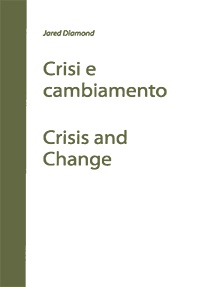
Numero: 1
Editore: FBK Press
Città: Trento
Anno: 2014
Pagine: 48
Cartaceo
| ISBN: | 978-88-98989-08-9 |
E-book
| ISBN: | 978-88-98989-09-6 |
Libro
«Oggi vorrei esplorare con voi la seguente questione: i singoli individui, così come le nazioni, attraversano crisi che possono essere risolte con maggiore o minore successo per mezzo di cambiamenti selettivi. Sulla risoluzione delle crisi personali esiste ampia letteratura. Ma le conclusioni raggiunte in questo ambito possono forse servire alla risoluzione delle crisi nazionali? In che cosa driscono le crisi nazionali da quelle personali?»
Indice
Presentazione
Crisi e cambiamento
Profilo biografico
Principali pubblicazioni
Autori
Jared Mason Diamond, nato a Boston nel 1937, rappresenta una figura di studioso poliedrico e versatile, che unisce il rigore di una competenza scientifica di altissimo livello, maturata attraverso una formazione accademica di prim’ordine, ad una pluralità di interessi di ricerca riguardanti il genere umano nel suo rapporto con l’ambiente circostante. La sua vastissima produzione letteraria annovera, accanto a opere di carattere prettamente tecnico-scientifico molto apprezzate per la loro capacità di apportare un significativo e originale contributo al dibattito internazionale sui temi trattati, numerosi studi che spaziano dall’antropologia, alla filosofia, alla storia.
Una chiave per comprendere la disinvoltura con la quale Diamond dimostra di sapersi muovere tra ambiti disciplinari apparentemente così distanti tra loro può essere individuata nel particolare rapporto instaurato dallo studioso con il campo di indagine della sua formazione originaria, la fisiologia, e nel percorso, non solo scientifico e accademico ma anche umano, che egli ha saputo costruire partendo da queste radici.
Dopo il conseguimento della laurea ad Harvard (1958) e di un dottorato di ricerca a Cambridge (1961), Diamond focalizzò la sua attività inizialmente sui meccanismi cellulari e molecolari degli ioni, dell’acqua e del trasporto di non elettroliti attraverso membrane biologiche. Più recentemente, i suoi interessi scientifici si sono spostati verso la fisiologia evolutiva. Al tempo stesso, egli ha sviluppato la sua carriera anche nell’ambito dell’ecologia, attraverso una serie di spedizioni sul campo finalizzare a studiare i volatili della Nuova Guinea e di altre isole tropicali del Pacifico sud-occidentale. Tali spedizioni hanno apportato un importante contributo alla chiarificazione del processo di formazione ecologica delle comunità di specie, dei fattori che regolano l’estinzione, l’immigrazione e la di versità di specie, oltre che della speciazione allopatrica nel contesto dell’espansione apparentemente ininterrotta degli habitat tropicali.
Diamond combina la ricerca accademica nel campo della biologia delle popolazioni con un impegno concreto per arginare la progressiva scomparsa della biodiversità nel mondo. Tale approccio è riconoscibile anche nei suoi studi a carattere storico-antropologico e socio-politico, nei quali si inserisce anche la Bruno Kessler Lecture qui proposta. In essi emerge almeno un altro elemento riconducibile alle esperienze geografico-naturalistiche vissute da Diamond durante i suoi viaggi, nonché argomento di numerosissimi suoi articoli apparsi su prestigiose riviste del settore: vale a dire uno spiccato gusto esplorativo, che da caratteristica personale dello studioso diviene un tratto metodologico costante nelle sue ricerche, unito a un approccio marcatamente sperimentale tipico dello scienziato puro.
Negli scritti di Diamond il punto di contatto tra la sfera naturalistica e quella afferente alle scienze umane è costituito dalla genetica, da lui ritenuta fondamentale, nella lucida consapevolezza che un’adeguata definizione della dimensione biologica dell’essere umano costituisce l’imprescindibile base di partenza per una più approfondita e autentica analisi della sua dimensione sociale in prospettiva storica, con particolare attenzione alle sfide della contemporaneità.
L’inconfondibile stile di scrittura di Diamond, che combina in maniera vincente eleganza letteraria e grande efficacia comunicativa, ha certamente contribuito al suo straordinario successo di critica e di pubblico, valendogli l’assegnazione di una lunga serie di prestigiosi riconoscimenti e premi internazionali.

